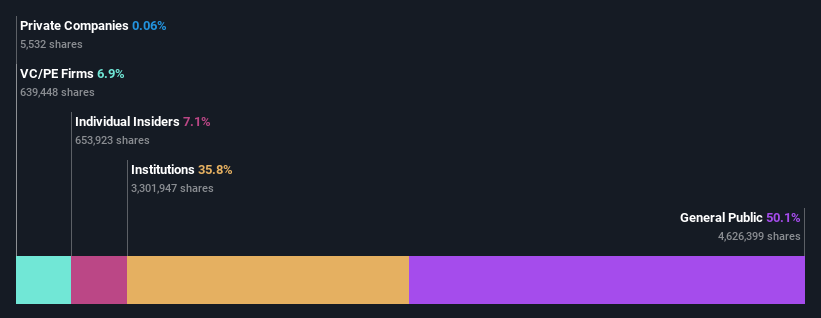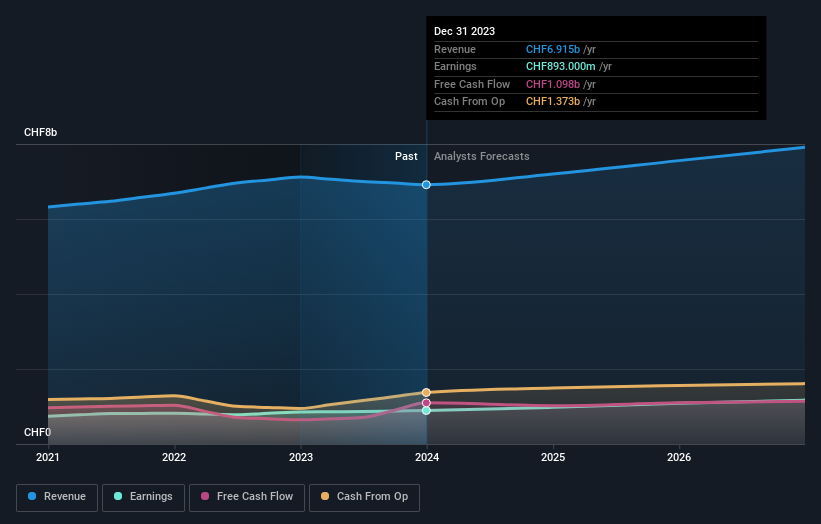- Switzerland
- /
- Chemicals
- /
- SWX:GIVN
Givaudan SA's (VTX:GIVN) top owners are individual investors with 50% stake, while 36% is held by institutions

Key Insights
- The considerable ownership by individual investors in Givaudan indicates that they collectively have a greater say in management and business strategy
- A total of 25 investors have a majority stake in the company with 43% ownership
- Institutional ownership in Givaudan is 36%
To get a sense of who is truly in control of Givaudan SA (VTX:GIVN), it is important to understand the ownership structure of the business. And the group that holds the biggest piece of the pie are individual investors with 50% ownership. Put another way, the group faces the maximum upside potential (or downside risk).
And institutions on the other hand have a 36% ownership in the company. Insiders often own a large chunk of younger, smaller, companies while huge companies tend to have institutions as shareholders.
In the chart below, we zoom in on the different ownership groups of Givaudan.
See our latest analysis for Givaudan

What Does The Institutional Ownership Tell Us About Givaudan?
Many institutions measure their performance against an index that approximates the local market. So they usually pay more attention to companies that are included in major indices.
As you can see, institutional investors have a fair amount of stake in Givaudan. This can indicate that the company has a certain degree of credibility in the investment community. However, it is best to be wary of relying on the supposed validation that comes with institutional investors. They too, get it wrong sometimes. If multiple institutions change their view on a stock at the same time, you could see the share price drop fast. It's therefore worth looking at Givaudan's earnings history below. Of course, the future is what really matters.

Givaudan is not owned by hedge funds. Cascade Investment, L.L.C. is currently the company's largest shareholder with 6.9% of shares outstanding. Melinda Gates is the second largest shareholder owning 6.9% of common stock, and BlackRock, Inc. holds about 5.1% of the company stock.
Our studies suggest that the top 25 shareholders collectively control less than half of the company's shares, meaning that the company's shares are widely disseminated and there is no dominant shareholder.
Researching institutional ownership is a good way to gauge and filter a stock's expected performance. The same can be achieved by studying analyst sentiments. There are plenty of analysts covering the stock, so it might be worth seeing what they are forecasting, too.
Insider Ownership Of Givaudan
The definition of an insider can differ slightly between different countries, but members of the board of directors always count. Management ultimately answers to the board. However, it is not uncommon for managers to be executive board members, especially if they are a founder or the CEO.
Insider ownership is positive when it signals leadership are thinking like the true owners of the company. However, high insider ownership can also give immense power to a small group within the company. This can be negative in some circumstances.
Shareholders would probably be interested to learn that insiders own shares in Givaudan SA. Insiders own CHF2.6b worth of shares (at current prices). It is good to see this level of investment. You can check here to see if those insiders have been buying recently.
General Public Ownership
The general public, who are usually individual investors, hold a substantial 50% stake in Givaudan, suggesting it is a fairly popular stock. This level of ownership gives investors from the wider public some power to sway key policy decisions such as board composition, executive compensation, and the dividend payout ratio.
Private Equity Ownership
Private equity firms hold a 6.9% stake in Givaudan. This suggests they can be influential in key policy decisions. Some might like this, because private equity are sometimes activists who hold management accountable. But other times, private equity is selling out, having taking the company public.
Next Steps:
I find it very interesting to look at who exactly owns a company. But to truly gain insight, we need to consider other information, too. Take risks for example - Givaudan has 1 warning sign we think you should be aware of.
Ultimately the future is most important. You can access this free report on analyst forecasts for the company.
NB: Figures in this article are calculated using data from the last twelve months, which refer to the 12-month period ending on the last date of the month the financial statement is dated. This may not be consistent with full year annual report figures.
New: Manage All Your Stock Portfolios in One Place
We've created the ultimate portfolio companion for stock investors, and it's free.
• Connect an unlimited number of Portfolios and see your total in one currency
• Be alerted to new Warning Signs or Risks via email or mobile
• Track the Fair Value of your stocks
Have feedback on this article? Concerned about the content? Get in touch with us directly. Alternatively, email editorial-team (at) simplywallst.com.
This article by Simply Wall St is general in nature. We provide commentary based on historical data and analyst forecasts only using an unbiased methodology and our articles are not intended to be financial advice. It does not constitute a recommendation to buy or sell any stock, and does not take account of your objectives, or your financial situation. We aim to bring you long-term focused analysis driven by fundamental data. Note that our analysis may not factor in the latest price-sensitive company announcements or qualitative material. Simply Wall St has no position in any stocks mentioned.
About SWX:GIVN
Givaudan
Manufactures, supplies, and sells fragrance, beauty, taste, and wellbeing products to the consumer goods industry.
Solid track record average dividend payer.


